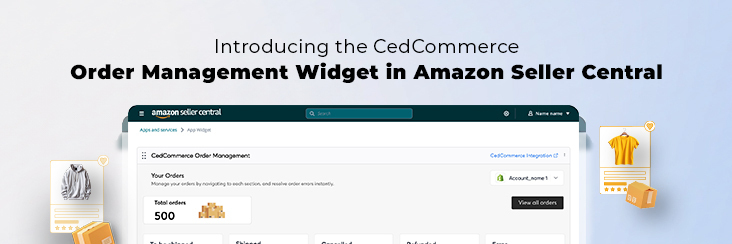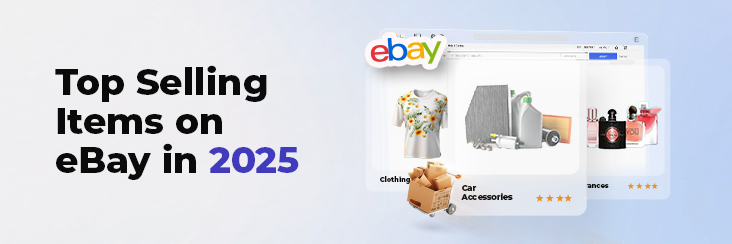Walmart Embraces Amazon MCF: A New Era of Cross-Platform Fulfillment for eCommerce
Walmart Embraces Amazon MCF: A New Era of Cross-Platform Fulfillment for eCommerce
Deciding whether to open an eBay business or personal seller account is a crucial step for anyone looking to start selling on the platform. Both options offer unique advantages and cater to different selling needs. In this blog post, we’ll delve into the key differences between the eBay business vs personal seller account types, helping you make an informed decision that aligns with your selling goals. Whether you’re a budding entrepreneur or simply looking to declutter your home, understanding the nuances of each account is essential for maximizing your eBay success.
eBay offers its users two account types,
An eBay personal account is ideal for casual sellers. If you’re looking to declutter your home by selling unwanted items, such as gently used clothing, electronics, or collectibles, a personal account is a great option. It’s also suitable for those who occasionally sell items like antiques or inherited possessions. Essentially, if selling on eBay is a hobby rather than a primary source of income, a personal account is likely the best fit.
A Business Account is for people who want to sell items regularly on the platform as part of their business. This type of account comes with additional features and tools specifically designed for businesses, like creating a personalized online store, managing inventory, accessing analytics tools, and listing items in bulk.
However, the cons of selling through the business eBay account include higher selling fees and more documentation. You need to verify your business entity when you select Business as your preferred eBay account type.
If you wish to sell on eBay full-time, deal in bulk sales, or resell products on the online marketplace the business account is what you should pick moving forward between eBay business and personal seller account. Look for these six signs in your sales if you want to register yourself as a Business when selecting the eBay account types but are not sure whether you should or not.
Suppose you are a reseller and deal in bulk listings on eBay. Getting yourself a business account is what you should do.
When you create the products you are listing on eBay (which means if you are already a manufacturer), getting yourself a business account is intelligent.
If you’re a seller who deals in large quantities of sales regularly, an eBay personal account will not entirely serve your purpose. Registering to a business account will reduce the various fees levied on your products and sales and open multiple other pathways for your business expansion like having an eBay storefront.
When you’re selling items on eBay that you acquired with the purpose of selling and not personal use, you should consider switching to a business account. It can be beneficial in the long run, helping you save taxes.
eBay gives you an option to sell for others if you fulfill certain selling criteria. So, If you’re operating as a selling assistant on eBay, it is highly advisable that you get yourself a business seller account. Selling products for other businesses on eBay is almost similar to selling your own products.
Having a business account means you can be flexible with the number of listings you’ll be asked to handle by the product owner.
If you’re buying items for your business, you should consider getting yourself a business account. eBay lets you conduct searches using keywords like “bulk,” “liquidation,” etc., for the products you plan to sell on eBay. It allows you to buy and resell the same on eBay with ease.
To switch your eBay account type from personal to business:
Before you set up an eBay seller account, it is important to consider who’s the winner in the eBay business account vs eBay personal account in your case. Here’s a list of the Pros and and Cons of both eBay account types that you need to consider when you set up eBay account.
For those who want to buy and sell items on eBay occasionally, a personal eBay account is a more suitable option due to its lower selling fees, more straightforward registration process, and ease of management. Ultimately, the decision to choose between a personal and business account on eBay should be based on the pros and cons of the online marketplace that addresses your specific needs and objectives of the individual.
Having an eBay business account comes with notable advantages when compared to a personal account. The benefits that can help you grow your business on eBay includes,
When you start selling under a business account, you need to pay additional taxes other than the personal taxes that you’re subjected to. It means more paperwork. However, more paperwork also means you’ll get more money in terms of savings from your taxes.
When you register for an eBay business account, you not only get a better and improved listing, but you also get access to various subscriptions. The subscriptions can be used for expanding your opportunities in terms of sales, promotions, and other benefits that eBay has to offer for its sellers.
When selling on eBay personal accounts regularly, you’ll find it challenging to manage your taxes and your income when the time comes. Whereas with a business selling account, you attach a legal name to your sales. All your invoices and bills get connected to the business name you select. It also paves the way for various deductions and benefits when filing your taxes.
The business account lifts many limitations that are imposed on personal accounts too. One of the most significant flaws of having registered for an eBay personal account is getting a minimum listing limit for items set to 10. The business eBay account raises the ceiling for the listings allowing you to sell more by listing more.
eBay has a lot to offer when it comes to its sellers. But, the problem you might face when trying to access them through a personal selling account is that they’ll be inaccessible. Various tools like Promotion Manager promoted listings, and others can help boost your sales manifolds.
However, switching to the eBay business account does not guarantee that you get instant access to all the seller tools eBay has to offer.
If you need any assistance, feel free to drop a mail. We’ll be more than happy to help.
There are a few disadvantages to using an eBay Personal Account type. Firstly, one of the most significant flaws of registering an eBay personal account is getting a minimum product listing limit set to 10. Additionally, you may only be able to access some of the features and tools available on a Business Account. You may also have less credibility as a seller than those with a Business Account, which could impact buyer trust and reduce the number of potential buyers. Finally, there is less protection for sellers in the event of disputes or fraudulent activity.
There are a few potential disadvantages to using an eBay Business Account. Firstly, Business Accounts may come with higher selling fees than Personal Accounts. It could impact profitability. Secondly, the registration process for a Business Account can be a bit more extensive and time-consuming. Additionally, the tools and features available on a Business Account may only be necessary for some businesses and could add complexity to the selling process.
The insertion and final value fees for eBay personal accounts are usually very low and affordable for occasional selling. For example, personal sellers who use eBay.co.uk are charged final value fees equal to roughly 12.8% of their total sale price or a minimum of 30p based on the item sold under most categories excluding items like Men’s or Women’s Trainers. While final value fees are constant for most goods and services, they can range from 4% to 9% for different categories.
On the other hand, eBay business accounts for sellers have more selling criteria, and the individuals are authorized to advanced selling tools. The business account holders can list many more items in a month and they can use tools such as promoted listingsstandard/advanced, and promotions manager tools.
eBay Business Account type can provide substantial tax advantages by allowing sellers to lower their taxable income with a range of expenses that are fully legally deductible.
Deductions can cover the costs of advertising, storage and inventorying, business-related banking fees, and travel expenditures as long as it relate to business. Moreover, eBay helps collect and collect sales tax, making it simpler for sellers to file taxes and establish a structured sales tax system.
Once you switch to an eBay business account there are more tax advantages as well as several other benefits like establishing an LLC or selecting S Corporation. Given those advantages and deductions, it is no surprise eBay will issue the 1099-K form when the transactions go beyond $600.
Reversion from an eBay business account to a personal one isn’t an instantly solvable situation by adjusting account settings independently. Precisely, this action requires a direct engagement with eBay’s customer support.
Your primary action in this regard should be to contact eBay directly to assist you. This is important if you have changed your tax ID data with eBay or if, even more likely, you have registered using an EIN instead of an SSN.
Restrictions are also connected with stipulations around eligibility to use advanced selling tools and promotions. In particular, eligibility for Promoted Listings Standard, Express, and Advanced is based on a seller’s performance status and account activity.
Sellers must have an Above Standard or Top Rated rating and demonstrate adequate account activity to achieve Promoted Listings Standard and Express. The latter further applies only items in categories that accept the tool can be listed in the specific ebay account type. Promoted Listings Advanced, in turn, provides advanced features for targeting and budget controls designed for sellers who want top ad placement. Cost-per-click values and effective campaign management are essential in this model.
It is best to operate the business account such that attaining the Above Standard rating is easier and faster.
While you can sell multiple items with a personal account, selling in bulk is generally more suitable for a business account. This allows for better inventory management and potential discounts.
Yes, you can use an eBay business account to sell handmade items. However, consider the specific requirements and fees related to handmade items.
The choice between an eBay business vs personal seller account type eventually lies with the kind of business you want to do. It’s evident that eBay’s seller account for Business is better than the personal account in the eBay account types eBay offers if you want more features. It unlocks better facilities, higher selling limits, and tools that would have been inaccessible otherwise.
Suppose you’re still selling with an eBay personal account or someone who’s been staring at your screen, perplexed about whether to select personal or business accounts. Set up an eBay Business account without any second thoughts. You should only have a personal account if you sell once or twice a month and are not considering expanding. But with eBay, why wouldn’t you?

Walmart Embraces Amazon MCF: A New Era of Cross-Platform Fulfillment for eCommerce

Order Management Redefined: A Centralized Solution for Amazon Sellers

Maximizing TikTok Shop’s Regional Compatibility for US, UK, and EU Markets

Understanding U.S. Tariffs in 2025: What Sellers Need to Know and Do

Walmart’s Search Algorithm Decoded: How to Rank Higher & Sell More

TikTok Gets a 75-Day Reprieve in the USA as Trump Signals Hope for a Deal

TikTok Shop Introduces Category-Based Benchmarks for Product Listings – What Sellers Need to Know

Amazon FBA vs. FBM: Which Fulfillment Method Is Right for You?

Amazon Launches Another AI Tool for Sellers: AI Generated Product Enrichment

Top 10 Selling Items on eBay in 2025

Amazon launches AI Powered ‘Interests’ Feature to Improve Shopping Experience

Is TikTok Staying in the US? The State of TikTok Ban

Best Buy coming back to the US, Marketplace Relaunch and New Opportunities in Store!

Miravia PrestaShop Connector: Built for Smart Sellers

Walmart Launches “Wally”, AI Assistant For Merchants

TikTok Shop to Start Business in Germany, France, and Italy

TikTok Shop Surges as Americans Spend $700 Annually, Defying Regulatory Pressures

Amazon’s Longest Prime Day Ever: What You Need to Know

eCommerce Growth in the Netherlands: A 5% Surge in 2024 with Bright Prospects Ahead

CedCommerce Launches Shopee & Lazada Integration for WooCommerce on WordPress.com